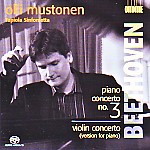No one who claims that interpreters today play the classics in a dull, mechanical, or characterless way can possibly be listening to the range of recent recordings on offer. There’s no question that Olli Mustonen is one of the most distinctive interpreters around; but like another of his colleagues, Mikhail Pletnev, whether he’s an aptly stylish one is another matter entirely. It probably would be wrong to claim that we are witnessing a revival of the Romantic aesthetic of a lost “golden age”. The truth is, the full range of legitimate interpretation in the 19th and early 20th centuries is poorly documented on disc, and when it comes to Beethoven, today’s interpreters are much farther away from the music’s origins but often far more technically adept than their predecessors. In practical terms this produces a much higher percentage of performances that sound willful or just plain peculiar.
Mustonen’s “poke and prod” approach to this music yields lumpish, goofy results that are very difficult to take seriously. The C minor concerto is one of Beethoven’s more dramatic and turbulent works, particularly in its opening movement. Mustonen makes it sound silly, with random sforzando accents constantly interrupting the music’s natural flow. His unconvincing rubato, very noticeable at the opening of the Largo, also destroys whatever momentum Beethoven is trying to create, while his Dadaist flourishes in the opening theme of the finale add insult to injury. It’s the same story in the D major concerto, made worse by the thinness of the piano writing and Mustonen’s refusal to play legato. His must be the most leaden account of the finale yet recorded.
Still, with all of these deficiencies, Mustonen can be interesting, often in passagework in the allegros of both concertos, where he illuminates an inner part or draws attention to some harmonic quirk where you least expect it. The problem is that he seems completely unable to distinguish between good ideas and bad, between flashes of insight and the much more frequent episodes of tasteless self-indulgence. Ultimately he sounds as if he’s noodling with music that bores him, and the result is that he winds up boring us too. It’s a pity. Mustonen remains a hugely talented musician who needs to grow up. Very good sonics and excellent orchestral playing unfortunately add nothing because Mustonen so relentlessly hogs the limelight–to Beethoven’s detriment. [Editor’s Note: These performances are now available in a set of the complete Beethoven Piano Concertos]
































